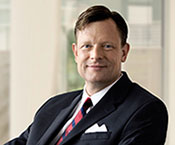Online bank ING-Diba targets business market
Yesterday daily Financieele Dagblad published an article on ING DiBa, focusing on its history, recent growth and especially its Commercial Banking strategy.

The article was based on an interview with ING-DiBa CEO Roland Boekhout in Frankfurt. Find this article in English translation below. You can download a pdf of the original article (including graphics) in Dutch here, courtesy of Het Financieele Dagblad.
ING Chief Ralph Hamers, who is set to unveil the interim figures on Wednesday, embraces business lending as the second pillar under the German activities.
A blaze of orange greets the visitor. Not just in the entrance hall, but also elsewhere in the building on the Frankfurt Theodor-Heuss-Allee. The revamped office has been home to ING-Diba, ING’s German online bank, since one year ago. Inspired by the ING’s trademark lion, the employees have nicknamed their new office ‘Leo’. A trendy company restaurant with mainly healthy food choices adds a tasty note to the informal atmosphere at ING-Diba.
Since ING bought its first stake in Diba back in 1998, the online bank has claimed the role of challenger in the German retail banking market. And with great success: the ING subsidiary is now Germany’s largest online bank boasting eight million customers.
In the years ahead, 51-year-old Roland Boekhout, who has been at the helm of ING-Diba since 2010, must prove that his bank can also make its mark in the German business lending market. That’s a tall order – because this market is even more traditional than the German retail market and notoriously hard to enter. This mission has acquired even greater urgency since Ralph Hamers (the new CEO of the parent ING Group since October) touted the German subsidiary as a ‘challenger’ in this market.
The move to build a second pillar under ING-Diba is being partly driven by changes in the European banking sector. Sitting in a conference room with a panoramic view over the centre of Frankfurt, Boekhout explained this step. “The savings that ING-Diba collects in Germany cannot be entirely put out in the residential mortgage market. That’s why the bank had invested a lot of money in government bonds.’
However, this carries the inherent risk of making the bank too dependent on the financial markets. Boekhout: “In times of crisis, bond prices can swing wildly.’ What’s more, since the onset of the financial crisis, the national regulators have increasingly demanded that savings deposits obtained in a certain country, must also be invested in that country.

ING-DiBa CEO Roland Boekhout
We want to get out of bonds, and instead
invest more money in assets we generate ourselves.
‘That’s why we want to invest more money in assets that we generate ourselves and whose risks we can assess more accurately,’ says Boekhout, who joined ING in 1991 and has held many different roles since then. ‘We do this by putting money into loans and export finance for companies.’
This process was started up in 2011 by transferring a portion of the loans to German businesses from Amsterdam to Diba’s books. Business lending now accounts for over € 5bn of a balance sheet worth € 127bn, an increase of 50% compared to the previous year.
However, if you think the German regulator Bafin welcomed this move, think again. ‘ING-Diba was a straightforward bank, with simple retail products,’ Boekhout explains. ‘Business lending is obviously a very different ball game from mortgage or consumer lending.’
So Diba’s expansion to business lending had to be carried out step by step. The German regulator’s scepticism needed to be overcome on various fronts. For instance, though the bank used ING Group’s tried-and-tested risk systems, Bafin still insisted on putting them through a rigorous check.
ING-Diba achieved growth in the business market last year, but Boekhout says there are still certain factors that are putting a drag on its development. ‘The market is full of liquidity.’ So everyone is looking for ways to invest the money. ’The consequence is that businesses are spoilt for choice.’ You often see that banks are not asked to extend a loan, but only to mediate in the capital market.’ In this case, the money comes straight from investors.
A second drag factor is Diba’s deep foundations in the retail market. This means that the bank has always exclusively done business in euros, whereas you also need to deal in other currencies for business loans and export finance. ‘We need to continue building that trade in foreign currencies.’ Despite the difficult market and the uncongenial conditions, the bank will be seeking to raise lending to a higher level in the coming years. Boekhout thinks growth to 10% to 15% of the balance sheet, working out at € 12bn to € 18bn, should be possible in the longer term.
I have to explain the link between ING-Diba and ING to entrepreneurs.
To increase its opportunities, Diba has expanded its potential market. ‘Our initial focus was on businesses with a minimum turnover of € 1bn. Now we are more sector-driven.’ The bank has singled out several sectors, including automotive, retail, energy and chemicals. ‘We picked the sectors where we have the most added value.’
Alongside Dutch businesses with activities in Germany, ING-Diba has also set its sights on German companies. But first of all, Boekhout must make ING-Diba more widely known in the German business market. ‘Remarkably enough, many are surprised when they hear that ING-Diba belongs to the banking giant ING. ‘ Many entrepreneurs never made this link themselves ‘even though they already had experience with ING abroad.’
